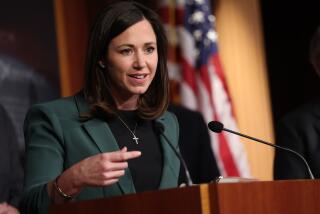Kerry Hesitates as Democrats Promote Immigration Plan
With stirring speeches in English and Spanish, senior Democratic lawmakers unveiled their party’s immigration reform blueprint Tuesday -- even though their presumptive presidential candidate, Sen. John F. Kerry of Massachusetts, had taken no position on the far-reaching legislation.
“The question is, ‘Where’s Kerry?’ ” said Harry P. Pachon, president of the Tomas Rivera Policy Institute, a Latino research center at USC. “It may be ... that he is worried about the backlash.”
Immigration is a politically charged issue, especially when voters are uncertain about the economy.
The Democratic measure would offer a route to citizenship for millions of illegal immigrants already in the country while setting limits on the future entry of foreign guest workers.
By contrast, President Bush has proposed a new guest-worker program -- with no numerical limits -- to fill jobs that Americans don’t want. Illegal immigrants already here could register as guest workers for up to six years, but they would have no guarantees that they could obtain green cards leading to citizenship.
Democrats described their legislation as the product of months of negotiation with key interest groups representing immigrants, labor and business. Sen. Edward M. Kennedy (D-Mass.), the proposal’s co-author and a mentor to Kerry in the Senate, called it an issue of “fundamental fairness.”
Kerry’s aloofness is “certainly curious or peculiar,” said Demetrios G. Papademetriou, president of the Migration Policy Institute, a nonpartisan policy center in Washington studying the movement of people worldwide.
A senior Kerry campaign official said that the candidate supported the concept of offering green cards to undocumented immigrants who were established, law-abiding workers, but that he had not yet decided whether he would endorse the Democratic measure.
“If comprehensive immigration reform passed the Congress this year, nobody would be cheering louder than John Kerry,” said policy director Sarah Bianchi. “We’re reviewing the details of the bill, but have long supported comprehensive immigration reform along these basic principles.”
Democratic sources said the Kerry camp was reluctant to sign on to specific bills that could be “picked apart” by Republicans. But immigrant advocates say they expect the candidate to define where he stands.
“If he plans to appear before national Latino organizations, I do think he’ll need a position by this summer,” said Larry Gonzalez, Washington representative for the National Assn. of Latino Elected and Appointed Officials.
Democrats have criticized Bush for being vague on the details of his immigration plan and unwilling to expend political capital to push it in Congress. On Tuesday, they drew a sharp distinction between their plan and the president’s.
“Unlike the president’s plan that says ‘come, work and adios,’ our legislation respects workers,” Rep. Luis V. Gutierrez (D-Ill.), a co-author of the proposal, said during an outdoor news conference with the Capitol dome as background. Television cameras, including those of the major Spanish-language networks, showed a multi-ethnic crowd of supporters waving American flags.
“Instead of second-class immigration status and a clear exit sign, we offer the same welcome mat that has been a fundamental part of our nation’s proud history,” Gutierrez added.
Rep. Robert Menendez (D-N.J.), speaking in Spanish, urged voters to crack the “whip” at the ballot box in November, so the bill could be passed next year.
Republicans called the Democratic plan unrealistic.
“I worry that this new bill does little beyond encouraging further illegal immigration,” Sen. John Cornyn (R-Texas) said in a statement. Yet some Republicans, including Sens. John McCain of Arizona and Chuck Hagel of Nebraska, have proposed plans that would allow illegal immigrants to seek green cards.
Separately on Tuesday, a Harvard scholar released a study estimating that immigration reduced the wages of U.S. male workers by an average of about 4% from 1980 to 2000, with heavier losses for high school dropouts, Latinos and African Americans. George J. Borjas, a leading immigration economist, said immigrants added to the supply of low-skilled workers, pushing down wages.
Previous studies have found a smaller or negligible effect on U.S. workers, but Borjas said he used a new method. His paper was presented at a discussion sponsored by the Center for Immigration Studies, a private research organization in Washington that supported restrictions on immigration. Other economists invited to speak at the event questioned whether the effect on the wages of U.S. workers was as large, and one suggested that Borjas might not have sufficiently accounted for the demand for low-wage labor.
Borjas said neither the Bush plan nor the Democratic bill would make for sound policy while illegal immigrants were still able to cross from Mexico. “It would be a great mistake,” he said. “Let’s actually control the border.”
More to Read
Get the L.A. Times Politics newsletter
Deeply reported insights into legislation, politics and policy from Sacramento, Washington and beyond. In your inbox three times per week.
You may occasionally receive promotional content from the Los Angeles Times.






